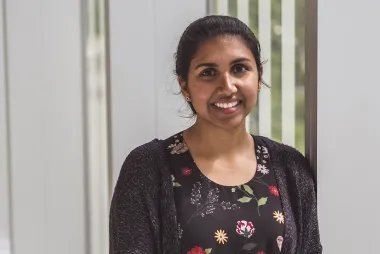"As a profession, we must lift one another higher in pursuit of further education, experience, and professionalism. By doing so, we all benefit."

Katelyn Merrett
- Degree:
- Master of Science in Nursing
- Grad year: 2021
- Program:
I entered nursing as a third career. I started my studies in Music and Education and trained as a high school music, biology, and outdoor education teacher. I quickly found my stride with an at-risk youth population in alternative learning environments and spent the majority of the next decade working for experiential education programs, which led to a career in wilderness-based therapy for youth with addictions. It was a was desire to continue this work that led me to pursue nursing. I completed my BSN at UBC in 2019 and began my nursing career on a medical/surgical nephrology unit. But my ambition for learning was still high.
I started an MSN degree in September 2019, focusing on nursing leadership, while continuing to work full-time. By the start of the COVID-19 pandemic, I was appointed into a frontline nursing leadership position in a long-term care home, which provided synergistic learning opportunities between my workplace and academia. But the pandemic also stoked my desire to pursue further critical care education. I completed an Advanced Certificate in Emergency Nursing from BCIT concurrent to my MSN and started a position in the VGH Emergency Department in late 2020. I graduated with my MSN in November 2021 and intend to continue merging my interests in long-term care, emergency nursing, and nursing leadership.
What has made your time at UBC memorable?
There are unique opportunities available to UBC graduate nursing students and I tried to take advantage of as many as possible. Knowing that I am interested in nursing education, I sought out two Teaching Assistant positions to gain lecturing and education experience at the undergraduate level. I also took advantage of practicum opportunities that the UBC MSN program offers for students who wish to apply their learning in the workplace. I benefitted from two practicum opportunities that paired me with local nursing leaders to implement my education outside of academia, offering invaluable experience in desired leadership roles. In addition to the supported experience of spearheading quality improvement projects in my own workplace, these experiences were also networking opportunities that led to future job offers and project involvement. I have maintained connections with both of my practicum mentors, who have become invaluable resources for support and connection in my career.
How are you applying the skills you learned through your studies at UBC?
The foundation of my MSN studies was in nursing leadership and research. As I was studying effective leadership at the graduate level, I had the opportunity to embody this learning as a Resident Care Coordinator in a long-term care home during the pandemic. Each week, I would learn about effective leadership strategies that I was able to implement in real-time at my workplace. A concurrent leadership practicum allowed me to further refine these skills under the guidance of an accomplished nurse leader to hasten my development and guide me through leadership challenges. I am also involved in quality improvement projects in my current role, allowing me to apply the research skills developed during my studies in partnership with an emergency medicine resident to inform practice change within my workplace.
What advice would you give a student entering your degree program?
I pursued graduate nursing education early in my career. I was excited to further my education and maintain the academic momentum that I had developed during my BSN. Yet, I was nervous to tell my colleagues that I was pursuing further studies. Several co-workers had voiced their disapproval of ‘novice’ nurses trying to advance their careers before completing their requisite “two-years’ experience” in a medical-surgical unit, so I began my studies cautiously and quietly. But as the pandemic altered workplace routines, my studies became an invaluable asset to my team. While I had started my MSN feeling an imposter, I embodied a fully engaged MSN student/nursing leader less than a year later.
Graduate education is beneficial for all nurses of all levels of experience and backgrounds. As a profession, we must lift one another higher in pursuit of further education, experience, and professionalism. By doing so, we all benefit. We raise the standard of practice for our patients, our workplaces, and ourselves, while creating healthy workplace culture and reducing nurse burnout. I find myself often encouraging others to pursue additional nursing education, from nursing specialty education, to upgraded clinical skills, to graduate school, and hope that we can change the conversation about nurse ‘readiness’ for advancement. I wish I had held this confidence at the beginning of my degree, as we are all lifelong learners, and our continued learning is invaluable.


